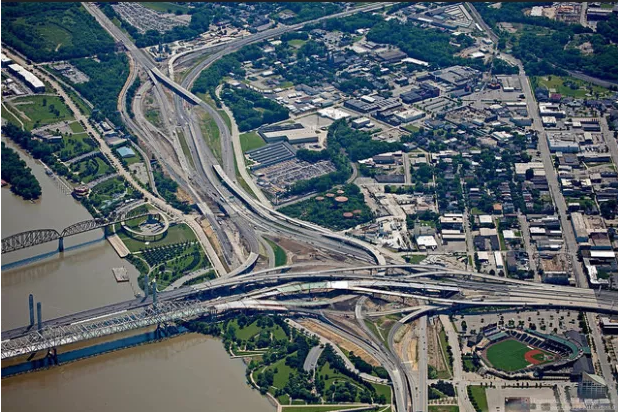Instead of building new roads and widening highways, there's a better way to spend $2 trillion in infrastructure without driving America right back to the 1950s in a gas-guzzling Oldsmobile, a new report argues.
The country must prioritize measures that shift commuters toward transit while fixing decaying bridges and essential roadways that are a public safety risk if neglected any longer, said the authors of the U.S. PIRG Education Fund study, "Roadmap for a Stronger, More Sustainable American Infrastructure" [PDF download]
“Deciding how much to spend before deciding what to spend it on puts the cart before the horse,” said Andre Delattre, a senior vice president at The Public Interest Network, which helped compile the report. “If Congress and the Trump administration avoid the temptation to spend indiscriminately and instead develop a bold new infrastructure vision, we have the opportunity to give our children and grandchildren a stronger, healthier and more sustainable future.”
In the past, lawmakers didn’t worry that building an interstate highway system could lead to sprawling neighborhoods, polluted air that triggers asthma attacks, and a dependency on fossil fuels that we’ve been unable to kick for more than a half century. Members of Congress don’t have that luxury today: New roads and widened highways will contribute to more pollution, congestion, and traffic crashes, while exacerbating global warming whether they like it or not.
So any plan must encourage more walking and cycling with an effect of curbing air pollution and reversing climate change.
“[We] must move us away from reliance on dirty fossil fuels and closer to a society that avoids wasting energy and powers itself with clean, renewable energy ” said Rob Sargent of the Environment America Research & Policy Center. “We should only build things that guarantee a healthier future, which means investing in energy conservation and clean, renewable sources of energy such as the sun and wind.”
Fortunately, the report provides a roadmap with recommendations along the same set of goals: pick new infrastructure projects that creates safer and healthier communities, fix things first and get the most of out existing structures, and avoid building something expensive that could become obsolete or abandoned before the end of its useful life.
When it comes to transit, for instance, politicians must spend money on transit projects or those with a public transportation component — such as new rail lines or lanes for rapid bus transit in existing roadways.
They should also boost funding in bicycle networks that expand across neighborhoods and pedestrian paths that make areas more livable
If they must invest in asphalt, they should favor repairing existing roads over new freeway projects which should be halted altogether. The federal Department of Transportation has a $420-billion backlog on highway maintenance, including $123 billion on rehabbing bridges, and 90 billion for public transportation projects alone.
And politicians must maintain that any discussion of highways should include policies that add or alter tolling to charge drivers more during peak travel times.
“Policies that alter the public’s use of infrastructure can also help avoid unnecessary construction. Highway widening has long been known to be an ineffective solution to congestion,” the report said. “Variable pricing of travel on busy highways, on the other hand, can address congestion by encouraging people to share rides or to shift travel to less congested periods of the day when congestion fees are lower.”
The larger challenge is political. Democratic leaders such as House Speaker Nancy Pelosi and Senate Minority Leader Chuck Schumer say they are committed to the environment, but neither supports the Green New Deal, a House-Senate resolution that calls for a radical overhaul of our transportation, construction, farming and energy sector.
The PIRG report provides a politically palatable blueprint for congressional leaders who might believe in the ethos of the Green New Deal, but don't want to be on record supporting a still-vague resolution being ridiculed on the right as some sort of effort to take away Americans' hamburgers.
Indeed, the PIRG approach simply breaks infrastructure needs into five obvious categories: energy, water, solid waste, transportation, and conservation (of forests and wetlands). Who could be opposed to that?
With a focus on enabling the transition to renewable energy, protecting forests and watersheds, overhauling recycling programs to process more plastic and glass, remediating water lines and pipes from contamination, and favoring public transportation projects that get people out of their cars, the study shows there's more than enough infrastructure needs that deserve federal funding beyond the same old highway and power plant plans.
"The renewed debate around our nation’s infrastructure is an opportunity," the study said. "If we focus on the right things, and use the right approaches, we can improve the quality of our lives today, assure a better future for coming generations, and act as faithful stewards of taxpayer money."






